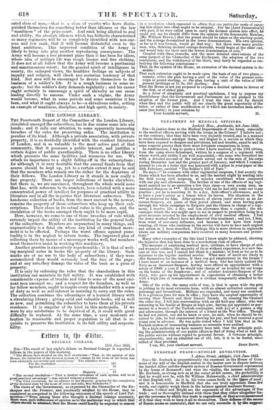TREATMENT OF MEDICAL OFFICERS.
Leaketh How, An:61681de, 4t18 June 1855.
:Sin-Is justice done to the Medical Departments of the Army, especially to the medical officers serving with the troops in the Crimea ? I believe not ; on the contrary, that they have been very-unjustly treated, and in a manner to create discontent amongst them, and disgust to a service in which they have been exposed to dangers and privations, toil and trouble, equal to and some respects greater than their more fortunate companions in arms. In confirmation, I beg to quote a letter I have received, of the 12th ultimo, from the camp above Sebastopol, written by a surgeon of a regiment with whose worth and ability I am well acquainted,-the same who furnished-me with a detailed account of -the rations -served out to the men of his corps during December last and' the greater part of January, and which'I commu- nicated to you in a letter that -was honoured with a place in yourpaper of the 24th February, entitled "TheRoldier's Bill of Fare."
He says" In common with other regimental surgeons, I feel acutely the blame which has been attached to us, and the marked slight by sending into the field young civil surgeons, at salaries exorbitant when compared- with our pay and allowances. The brother of one of the officers of my regi-- meat assisted me in an operation a few days since-a very young man, an Assistant-Surgeon in ***. He honestly told me he had only come out to see practice ; yet he is receiving 21. 2s. a day, field-officer's allowances, and is to have a year's salary as a bonus when he leaves. His situation in the *** is reserved for him, After -upwards of eleven years' service as an As- sistant-Surgeon, six years of that period abroad, and since having-gone through the whole campaign in Bulgaria and the-Crimea in aharge of a regi- ment, I receive 138. a day, and less allowance than ,a captain ; the ad- vantages which the war might open to me in respect to promotion being in a great-measure arrested by the employment of civil medical officers. 1 feel the Army medical officers have not deserved this treatment ; and yet, I fear, from wanting, nwga want otfh onseeePwssahorYcotlitliei: influence, the ds service tusil-1131ah atvtoha3r such neglectn feogunlecat and odium as I have described. Perhaps this is more obvious in regiments where our military companions have received so many honours and promo- tions."
Many other examples of the like kind I know might be adduced, showing the injustice that has been done to a meritorious class of officers. The measure of employing medical men, civilians, to have oharge of sick and wounded soldiers, the majority of them without experience, is a new fea- ture of this war, and I cannot but think is a mistake, at least so far as to be injurious to the regdlar medical service. What men of merit are likely to
offer themselves for the latter, if they can get employment in the former'?I have heard of an-instance of a medical -man, who has lately quitted :the Navy as an Assistant-Surgeon, having been offered an appointment with a salary of 20001. a year if he-would take charge-of an hospital for our' troops on the banks of the Bosphorus.; and of another Assistant-Surgeon of the Navy, who .gave up his appointment in expectation of obtaining a better with a high rate of remuneration as a civilian 'temporarily'attached-to the Army. One of the evils, the manyevils of war, is that it opens wide the gate to jobbing in its most extensive form, with-an almost unlimited exercise of patronage and favouritism. Millions are expended, and many are enriched. It is a glorious time for men in office ; they have the amplest opportunity of serving their friends and their friends' friends. In crossing the Channel the other day, I fell into conversation with an Oldhalf-pay officer, who was returning to his family at Bruges in high glee, .having got appointed as pay- master to a branch of the Turkish contingent, with pay of a guinea a day and allowances, through the.interest of a friend at the War Office. Though he had not joined, nor did he know or care, he said, when he should be re- quired to join, he had commenced drawing his pay, and had received a good round sum in advance. He was quite elated when I told him that in the Turkish system of transacting business no accounts were audited. By a high authority we have recently been told, that the principle guid- ing the administration of our.publie affairs is that of -doing what is best for the public service without -regard to personal favour. A virtuous principle, unquestionably, and an admitted one of old, .but, it is to be feared, more- talked of than practised.


























 Previous page
Previous page